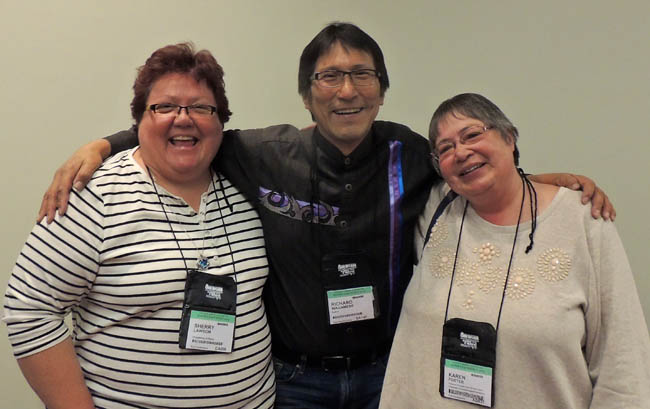Wagamese came in from the rain

By Christine Smith McFarlane
TORONTO – Stories are what we are all about, and no one knows this better than renowned author Richard Wagamese, an Ojibway from Wabaseemoong First Nation in Northwestern Ontario.
Wagamese, one of Canada’s highest-profile Native authors and storytellers, spoke to a crowd of about 400 people as part of the Aboriginal Stream Spotlight session: “Libraries Change Lives” during the Ontario Library Association’s “Super Convention”.
Wagamese said he had to start at the beginning.
“I was born in a trapline camp with spruce boughs that lined the floors. My parents and extended family were survivors of residential school, and my brothers, sister and I were eventually abandoned in the middle of a snowstorm, and put into foster care.
“Initially I was put into foster care with my brothers, but then it was decided that I could be put into a foster home on my own. When I was eventually adopted out into a non-native home, I disappeared from my people for 22 years. I suffered emotional, physical, spiritual and sexual abuse at the hands of my adoptive family.”
After years of personal struggle, Wagamese credits his encounter with a kind librarian in St. Catherines, Ontario and the accessibility of this library that helped change him into the reader and writer he is today.
Wagamese says he still has a hard time believing how far he has come.
“Every time I hear this introduction about myself and what I’ve accomplished, I still have to ask myself, ‘How did everything that was mentioned in the introduction happen? How did it happen to this guy standing in front of you?’
“The reason it became possible is because of the very genesis and existence of libraries,” he says, recalling that he stepped into a library the very first time because it was raining outside, and needed to go somewhere warm and dry off. As he sat in a chair, drinking in the quiet of the library, a security guard came up to him and said “If you’re not going to read, you have to leave.”
It was after this introduction that he began to go to the library every day, and absorb as many books and information as he could.
“The books in the stacks became my friends, because they sheltered me. They were my shelter, because they filled me up, and made me feel okay for the first time in my life.
“But the most important part of this story is not about me, it’s about you guys, and the availability at any moment that you will give a haven to someone who feels displaced. It is about allowing us to build a fortress of knowledge around us, allowing young people to read because the culture of books is free to all of us, and you may know everything that’s in your collection but you don’t know the Creator’s plan for that person. The librarian that helped me, had no idea what Creator’s plan was for me. Libraries change lives.”
Sherry Lawson, Chippewas of Rama, loved the presentation.
“I’ve heard Richard speak on several occasions and each time the stories he tells are a little different and more compelling. Everyone on Turtle Island needs to spend time with Richard because he is an incredible speaker and storyteller.”
Richard Wagamese’s most recent novel “Indian Horse” is the First Nation Communities Read Program’s current (2013-2014) and 10th anniversary title selection. First Nations Communities Read, a program initiated by the First Nations public library community in Ontario, promotes Aboriginal literature and community reading and takes place year-round in Aboriginal and non-native communities across Canada.
Wagamese’s next book “Medicine Walk” was due to be released this spring by McClelland and Stewart.


